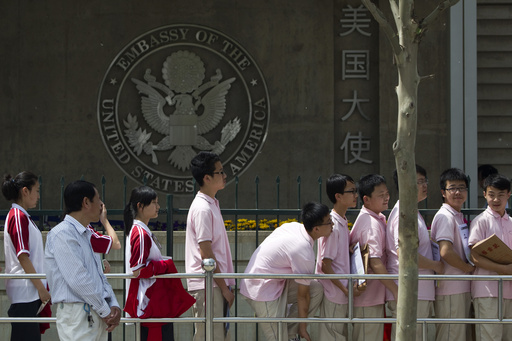China protests US border interrogations, deportations of its students

Chinese students wait outside the U.S. Embassy for their visa application interviews on May 2, 2012, in Beijing. The Chinese government has protested to the United States over the treatment of Chinese arriving to study in America. Ambassador Xie Feng said in Washington on Sunday, Jan. 28, 2024, that dozens of Chinese have been denied entry in recent months when returning to school from overseas travel or visiting family in China. AP FILE PHOTO
BEIJING — The Chinese government has protested to the United States over the treatment of Chinese arriving to study in America, saying some have been interrogated for hours, had their electronic devices checked and in some cases were forcibly deported from the country.
Xie Feng, the Chinese ambassador in Washington, said dozens of Chinese holding valid visas have been denied entry over the past few months when returning to school from overseas travel or visiting relatives in China, according to a post on the Chinese Embassy website.
“When they landed at the airport, what awaited them was an eight-hour-long interrogation by officers who prohibited them from contacting their parents, made groundless accusations against them and even forcibly repatriated them and banned their entry,” he said Sunday at an event at the embassy on student exchanges. “This is absolutely unacceptable.”
The protest comes as the U.S. and China try to boost student and other exchanges to shore up their relations, which have turned confrontational in recent years over trade, technology, human rights and, more fundamentally, the future direction of the world.
READ: China accuses US of harassing Chinese students, researchers
Nearly 290,000 Chinese students are in the U.S., about one-third of the foreign students in the country, according to the embassy post. China has more than 1.3 million students studying abroad, more than any other country, it said.
In a separate online statement, the Chinese Embassy said it had made “solemn representations” to the U.S. government about the treatment of students arriving at Dulles airport in Washington, D.C. The statement reminded Chinese students to be cautious when entering through the airport.
It wasn’t clear whether Xie’s comments referenced cases only at Dulles or at other entry points as well.
China’s state media have reported at least three cases since November at Dulles where Chinese students lost their valid student visas, received a five-year entry ban and were repatriated following long hours of interrogations,
They were asked if their studies were financed by the Chinese government, if they were members of the Chinese Communist Party or its youth arm, and if their research was linked to the Chinese government, the Chinese military or key state laboratories. The students were headed to the National Cancer Institute, Yale University and the University of Maryland respectively.
At least eight Chinese entering the U.S. with valid documents were repatriated since November, according to state media reports.
The U.S. Department of Homeland Security and the American Embassy in Beijing did not respond to requests for comment.
The Chinese Embassy statement said the affected students had their electronic devices checked, were prohibited from communicating with anyone outside and, in some cases, held for more than 10 hours. It said the actions of border control officers “have had a serious impact on the studies of international students from China and caused great psychological harm.”
The statement also said that the actions ran counter to the agreement between Presidents Joe Biden and Xi Jinping at their meeting last November to promote people-to-people exchanges.